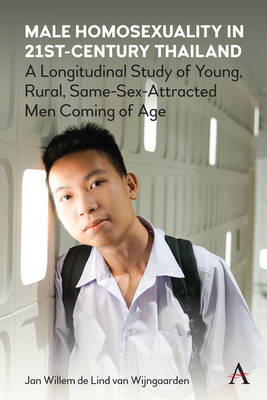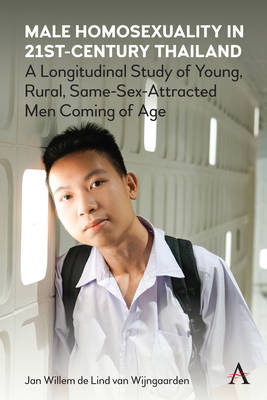
- Afhalen na 1 uur in een winkel met voorraad
- Gratis thuislevering in België vanaf € 30
- Ruim aanbod met 7 miljoen producten
- Afhalen na 1 uur in een winkel met voorraad
- Gratis thuislevering in België vanaf € 30
- Ruim aanbod met 7 miljoen producten
Male Homosexuality in 21st-Century Thailand
A Longitudinal Study of Young, Rural, Same-Sex-Attracted Men Coming of Age
Jan W de Lind Van WijngaardenOmschrijving
This book presents the very first analysis of male homosexuality in modern rural Thailand that is based on sociological/anthropological research directly with 25 young same-sex attracted men. It explores changes in the way men view and describe their sexuality over time by interviewing them three times over a period of around 18 months. The men are followed during an important transition in their lives: the end of their high school years and the end (in most cases) of their life as a child with parents or extended family at a rural home. Nearly all decided to move to a city to continue their education or to find work. Some also had stints with sex work in one of Thailand's well-known centers for prostitution. For nearly all men, this transition brought them into contact with new ideas about gender and sexuality, and many experienced an abrupt increase in their opportunities to have sex, leading to a readjustment of their moral universes. The young men in the study were still in the process of figuring out who they were/wanted to be, and many contradictions emerged in their narratives over the period of data collection. These contradictions, and the way they were resolved, presented an opportunity to critically explore the way the social structures in which these young men operate influence the way they think and explain their own sexual/gendered selves, and how changes in these social structures affect their sense of self.
A number of explanatory 'lenses' are used in the different book chapters that zoom in on different structuring/explanatory frameworks for making sense of gender and sexuality in Thai cultural contexts, as used and applied by the study participants. The first is Buddhism. Buddhist beliefs and traditional ideas about karma, fate, hierarchy, family, masculinity and femininity played important roles in the young men's childhood understandings about homosexuality and same-sex relations- especially in terms of their cause and morality. The second lens for understanding male homosexuality in Thailand is gender, where men are divided into feminine-oriented bottoms and masculine-oriented tops. A third lens is modernity/the desire to develop and grow, closely linked to Thailand's globalizing economy and the increasing role of the Internet and social media. The Internet functioned as an important 'playground', a platform for trying-out different presentations of the self via Facebook and chat applications - and in many men this resulted in a rejection of their previous self-presentation as effeminate, which they gradually started to associate with being backwards, rural and 'traditional'. The fourth lens is related to economy. Many of the young men in the study searched for romantic relationships based on complementarity and were looking for boyfriends who had something they did not have--money, a better position in society, or 'wisdom'/the ability to guide. Most of the more effeminate men saw their sexuality as valuable, and several of the study participants described in this book - especially those coming from poor families - engaged in sex work and used their youth and beauty to find a wealthy long-term partner, in the hope of lifting their families out of poverty, towards a more prosperous future. The fifth lens is nationalism, or more specifically the concept of 'being a good Thai'; gradually the young men learned that the Thai sense of self and the importance of performing one's role as a 'good' son in public can be used as a strategy to cover-up private behaviors and desires. The sixth and final lens is family. Being 'good', respecting elders and elder siblings, financially supporting (grand-)parents, having good manners, meaning 'acting appropriately in time and space', gave the young men a way to retain the respect and support of elders and seniors, and determined how they dealt with (non-)disclosure of their sexuality to their families and others and explained their ability and desire to remain part of the mainstream of society. In the final chapter, a discussion about three critical concerns pertaining the health and wellbeing of same-sex attracted Thai men are discussed in the light of this proposed model: the ongoing HIV epidemic, mental health and LGBTI rights.
Overall, this book presents significant new insights about the Thai sex/gender system, particularly on how it is affected by processes of globalization and the ascent of the Internet and mobile phones as tools for dating and romance.
Specificaties
Betrokkenen
- Auteur(s):
- Uitgeverij:
Inhoud
- Aantal bladzijden:
- 218
- Taal:
- Engels
- Reeks:
Eigenschappen
- Productcode (EAN):
- 9781839989230
- Verschijningsdatum:
- 2/05/2023
- Uitvoering:
- Paperback
- Bestandsformaat:
- Trade paperback (VS)
- Afmetingen:
- 152 mm x 229 mm
- Gewicht:
- 326 g

Alleen bij Standaard Boekhandel
Beoordelingen
We publiceren alleen reviews die voldoen aan de voorwaarden voor reviews. Bekijk onze voorwaarden voor reviews.













